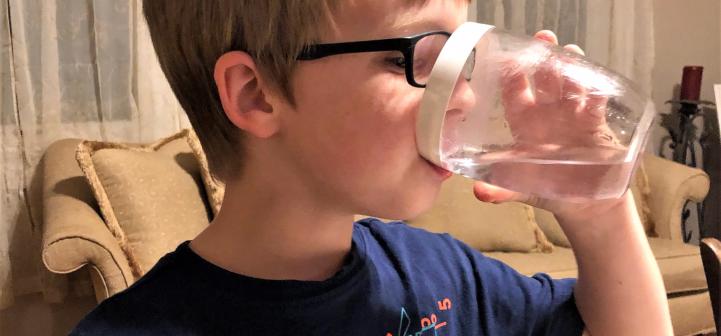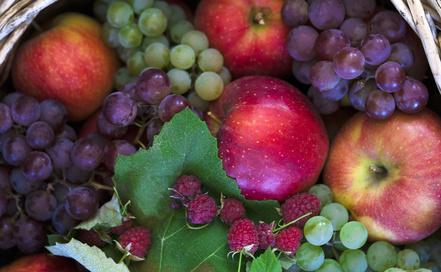
Water. It’s the single largest component of the human body and vital for life. Water helps the body perform important functions such as regulating temperature, protecting cells, and carrying nutrients and waste. We lose water/fluid in three ways: breathing, perspiring and urinating. The amount of fluid lost during a day depends on factors like age and gender, outside temperature, physical activity, clothing, and medical conditions. Losing too much fluid causes fluid imbalance, commonly called “dehydration.”
Dehydration
Even mild dehydration can harm a child’s health and performance. Losing as little as 2% of body weight from dehydration can decrease alertness, slow response time and affect memory and reasoning.7,8 This is important news for children, who need to be able to study and focus to do well in school.
How do you know if a child is dehydrated? Common symptoms include headaches, crankiness, fatigue or dizziness. Two key indicators are urine color (dark yellow urine is often a symptom) and urinating less than every 2-4 hours. In other words, if your child can go a whole school day without urinating, he or she is probably dehydrated.5
Types of Fluids
The type of fluid a child drinks is important. Water is great for quenching thirst and has no calories. For kids who don’t like the taste, add cucumber, mint or fruit to give just a hint of flavor. Fat-free/Low-fat chocolate milk is the new “go to” drink for sports recovery because it replaces minerals and electrolytes while adding calcium to build strong bones.10 Fruit juice is full of vitamins and nutrients but because it is also full of sugar, it’s best to limit to 6 ounces or less per day. Kids can “eat” some of their fluids too. Many fruits and veggies are full of water. Watermelon, for example, is almost 90% water. Other good choices include different melons, oranges, cucumbers, lettuce and tomatoes.6 Limit sodas to special occasions. Giving children soda is like offering them a lollipop with their meal because of the drink’s high sugar content and lack of nutritional value. Energy drinks should always be avoided, as they contain high volumes of both caffeine and sugar. They offer a burst of energy that can trigger a rapid heartbeat and stomach pain.
Develop Healthy Habits
Fortunately, it is easy for parents and teachers to help children develop healthy hydration habits.
- Offer smaller amounts of fluid through the day to keep kids hydrated without getting too full.
- Let kids pick their own water bottles.
- Put a frozen water bottle in the lunch box, especially in hot weather.
- Water down juices instead of offering them full strength.
- Offer plenty of tempting, handy fruit and veggie snacks – and keep them at eye level in the refrigerator for kids to grab.
- Save the sodas and other sugary drinks for special occasions.
Any way you look at it, keeping kids well hydrated is an important step on the road to good health!
Contributor
Ginny Hinton, MPH, University of Florida/IFAS Extension
Sources
1NSW Ministry of Health, NSW Department of Education, Office of Sport and the Heart Foundation, (2018). https://www.healthykids.nsw.gov.au/kids-teens/choose-water-as-a-drink-kids
2United States Department of Agriculture, WICworks Resource System. https://WICworks.fns.usda.gov
3Wheeler, R. (2016). Smart Sips for Healthy Kids. WebMD Feature. https://www.webmd.com/parenting/guide/kids-healthy-hydration?
4American Heart Association. (Sept 2014). Staying Hydrated – Staying Healthy. https://www.heart.org/HEARTORG/HealthyLiving/PhysicalActivity/FitnessBasics.
5Soong, J. (2011). What Counts as Water? Stay Hydrated and Healthy. WebMD Feature. http://www.webmd.com/parenting/features/healthy-beverages.
6Caruso, L., Shelnutt, K., Kauwell, G. (August 2014) Hydration Myths. University of Florida/IFAS Extension, Gainesville, FL. http://edis.ifas.ufl.edu/fy1409.
7D’Anci, KE, Constant, F., Rosenberg, IH. (Oct 2006) Hydration and cognitive function in children. Nutrition Review. https://www.ncbi.nlm.nih.gov/pubmed/17063927.
8Benton, D., (May 2011). Dehydration Influences Mood and Cognition: A Plausible Hypothesis? Nutrients. https://www.ncbi.nlm.nih.gov/pmc/articles/PMC3257694.
9Edmonds, C.J., Burford, D. (2009) Should children drink more water?: the effects of drinking water on cognition in children. PubMed.gov. https://www.ncbi.nlm.nih.gov/pubmed/19501780.
10Roy, BD. (2008) Milk the new sports drink? A Review. Journal of the International Society of Sports Nutrition. www.ncbi.nlm.nih.gov/pmc/articles/PMC2569005.
